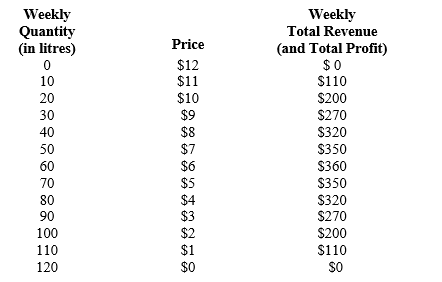Table 17-1
Imagine a small town in which only two residents, Matthew and Anna, own wells that produce water for safe drinking. Each Saturday, Matthew and Anna work together to decide how many litres of water to pump, bring the water to town, and sell it at whatever price the market will bear. To keep things simple, suppose that Matthew and Anna can pump as much water as they want without cost; therefore, the marginal cost of water equals zero.
The weekly town demand schedule and total revenue schedule for water is reflected in the table.
-Refer to Table 17-1.Since Matthew and Anna operate as a profit-maximizing monopoly in the market for water,what price will they charge to sell 80 litres of water
Definitions:
Resale Price Maintenance
A practice where manufacturers or suppliers dictate the minimum price at which retailers can sell their products, often scrutinized under competition laws.
Refusal to Supply
An act whereby a business decides not to sell or provide goods or services to another business or individual.
Competition Act
Legislation aimed at promoting fair competition in the market by regulating anti-competitive practices.
Bait-and-Switch
A deceptive marketing practice where customers are lured by an advertised deal that is too good to refuse and then are pressured into purchasing a more expensive item or service.
Q4: What is a special kind of imperfectly
Q5: When a monopolistically competitive firm is in
Q10: Which statement explains the characteristics of a
Q10: Refer to Figure 15-2.Which curve depicts the
Q37: The phenomenon of product differentiation contrasts sharply
Q55: Refer to Figure 15-1.In view of what
Q88: When the supply of workers is plentiful,what
Q123: For a firm to price discriminate,what must
Q203: What is the main social problem caused
Q213: Like monopolies,competitive firms choose to produce a